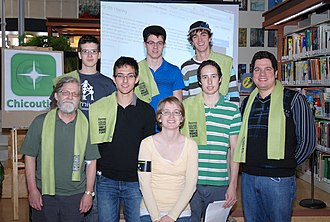Original post with footnotes can be found on Meta-wiki
I am Simon Villeneuve. I have taught physics and astronomy at the Cégep de Chicoutimi, a college in Quebec (Canada), since 2005. Since the 2008 fall semester, I have used the French Wikipedia in my astronomy class and have introduced my students to the commons-based peer production principle of public wikis. I coordinate their work with the Cégep de Chicoutimi pedagogical project.
Like it or not, the free encyclopedia will take an increasing place in the education world[1]. I believe Wikipedia is a wonderful educational tool for learning a lot of stuff like critical thinking, peer production principle, ability to find and evaluate the quality of sources and, especially, production of online libre knowledge that anyone can reuse.
In this post, I discuss some results of my school project and resources we created in order to follow and frame more easily the students assignments.
A work in progress
It took me a long time to evaluate the kind of Wikipedian work I could ask my students. At first, I assigned them two tasks:
- Contribute 20 edits in the main space, with a minimum of 10 astronomy-related edits.
- In teams, significantly expand an astronomy article of your choice.
I tought the first assignment was sufficient for students to learn the ropes of the encyclopedia, enough to complete the second task. Impressed by the results of the Wikipedia:WikiProject Murder Madness and Mayhem, I wanted to lead my students in the drafting of good and featured articles. It was a disaster, plain and simple.
I came to realize that mastering the basics of MediaWiki and the encyclopedic style are very difficult to the average human being. I overestimated the degree of computer skills from my supposed digital natives digital naives, as well as their ability to master the encyclopedic genre.
This led me to develop a learning process involving six, rather than two, assignments and focus their work on brand new articles or stubs.
Results
Here are some results:
| Year[note 1] | N[note 2] | Editions[note 3] | Creations[note 4] | Octets[note 5] | Articles[note 6] | Octets articles[note 7] | Words[note 8] · [2] | Assessment[note 9] |
|---|---|---|---|---|---|---|---|---|
| Total | 155 | 6,003 | 157 | 1,160,933 | 71 | 467,840 | 46,784 | 29 Start/C, 5 B |
| 2012 | 36 | 1,301 | 68 | 249,862 | 14 | 78,856 | 7,886 | 7 Start/C, 1 B |
| 2011 [note 10] | 34 | 1,509 | 48 | 390,923 | 29 | 164,075 | 16,408 | 8 Start/C, 1 B |
| 2010 | 32 | 1,356 | 11 | 210,145 | 18 | 120,563 | 12,056 | 10 Start/C, 1 B |
| 2009 | 34 | 1,603 | 11 | 261,031 [note 11] | 10 | 104,346 | 10,435 | 4 Start/C, 2 B |
| 2008 | 19 | 234 | 19 | 48,972 | 0 |
The last four columns show the results of the main assignment in which I asked teams of students to significantly develop one article.[note 12]
Since 2009, I also ask students to fill a short survey at the end of the semester. The survey is far from perfect, but it gives a general idea about the perception of the project by the students, including the gender gap.
You can get a detailed overview of the results on (fr) Wikipédia:Projets pédagogiques/Cégep de Chicoutimi/Résultats.
Other WMF projects
My use of wikis in the classroom is not restricted to Wikipedia. I also introduce the students to other Wikimedia Foundation projects.
Some contributed to Commons[note 13] and participated in the 2012 Wiki Loves Monuments contest.
In the last weeks, the students wrote astronomy and astrophysics news items on Wikinews.[note 14] One article, (fr) “fr:Le géocroiseur 2012 DA14 s’approche de la terre” was showcased on the site’s Main Page for several days.
I also introduced my students to Wikisource. One of them has started working on a French translation of the Einstein–Szilárd letter and of Churchill‘s “We shall fight on the beaches” speech.[note 15]
Resources
There are very few French resources and appropriate tools to help teachers to achieve educational activities using Wikipedia.
With the help of Wikipedians like Lilyu and Benoit Rochon, we created several templates and specialized categories to help us identifying students activities as well as articles they worked on. To get an idea of these resources, see the (fr) Catégorie:Projet:Cégep de Chicoutimi.
Over time, I was able to gather a core of education stakeholders interested in creating open educational resources by organizing various activities, such as the (fr) 2011 copyleft day. Thus, with the help of such fellow Wikipedians/Science and Mathematics teachers Cantons-de-l’Est and Letartean, we have created a number of exercises.[note 16]. While still very sketchy at this stage, I believe that this approach can serve as a guide to create a turnkey approach for an educational use of Wikipedia by fellow teachers.
Our latest initiative is the establishment of a partnership with the digital library Les Classiques des sciences sociales with the launch, in February 2013, of a new collection dedicated to natural sciences[3]. We have taken this initiative because the eligibility policy on French WikiSource is much more restrictive than what is acceptable under Canadian law. The new collection, with free texts in 5 formats (.html, .pdf, .doc, .rtf, and .epub), provides access to the French text from renowned scientists such as Isaac Newton, Charles Darwin, René Descartes, Albert Einstein, Gregor Mendel, and Ernest Rutherford.
That’s about all I can tell you for now. If my Wikimania 2013 presentation is accepted, I’ll be able tell you more face to face. ![]()
Simon Villeneuve, Cégep de Chicoutimi

Can you help us translate this article?
In order for this article to reach as many people as possible we would like your help. Can you translate this article to get the message out?
Start translation


